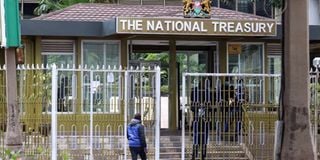Premium
How Treasury delays end up making every Kenyan broke

The entrance to the National Treasury building in Nairobi.
What you need to know:
- The delays have a serious knock-on effect that slows down the entire economy.
- The money multiplier, quite volatile with the advent of mobile money, now hovers around 7.5 times.
This past week the National Treasury disbursed equitable share, Level 5 hospital grants, user fees and grants to youth polytechnics totaling Sh43.48 billion. This cleared outstanding equitable share balances for up to April, but while a big step forward, it was clearly not enough to clear all pending bills.
As thing stand, it looks like we will close the fiscal year on June 30, 2021 with counties equitable share for May and June outstanding. What are the consequences? Non-adherence to the law, delayed salaries, strain on the health sector, piling pending bills, and, worst of all, muted economic activity.
By not disbursing the full amounts of equitable share, the National Treasury is in breach of the County Allocation of Revenue Act, as well as Article 219 of the Constitution, which directs that a county’s share of nationally raised revenue shall be transferred to it without undue delay.
It further puts the counties themselves in breach of the PFM Act by forcing them to make late commitments. Thereafter counties are blamed for “low budget absorption”. Delayed salaries demotivate staff. Their health insurance premiums go unpaid, making it more difficult for them to access health care. It ruins their credit history, curtailing access personal credit. But that is not all. It puts the lives of many Kenyans at risk.
Audit of pending bills
Discussions on pending bills have taken place many times at various decision-making fora – the Council of Governors, Intergovernmental Budget and Economic Council (IBEC) and The Summit. A second audit of pending bills in as many years concluded just this week. And although pending bills arise for a several reasons, by far the main one is delayed disbursements.
And the delays have a serious knock-on effect that slows down the entire economy. The money multiplier, quite volatile with the advent of mobile money, now hovers around 7.5 times. A four-month disbursement delay as has been the case is equivalent to withholding about Sh750 billion from the economy. Is it any wonder that the refrain there is no money is heard everywhere in the nation?
The frequency at which a shilling is used to purchase domestically produced goods and services in a given time period is called the velocity of money. Increase in mobile money has meant that while the velocity of physical shillings has declined steadily, that of e-money has skyrocketed.
A mobile money shilling is spent to buy goods and services many, many times per day. That is how traders can fuliza at mid-night, buy vegetables in bulk, sell them by 7am at marikiti, and have settled their accounts by 7.30am. The pending bills pile-up brings all this to a dead stop.
Given the string of inflows over the last few weeks – Sh44 billion from IMF, Sh80.9 billion from World Bank, Sh108 billion from the Eurobond, other concessional finance, taxes (Sh176.7bn in April alone), why is the Treasury unable, nay, unwilling, to correct this imbalance?
Ndiritu Muriithi is the independently elected Governor of Laikipia County





